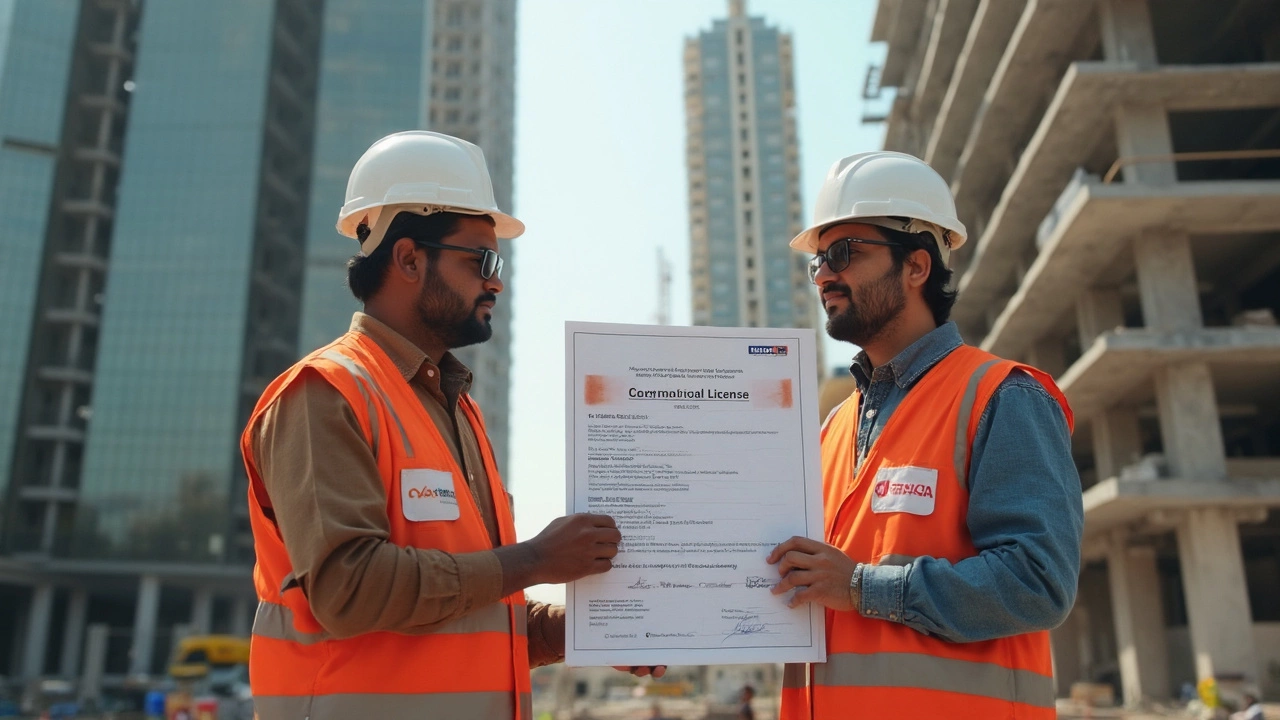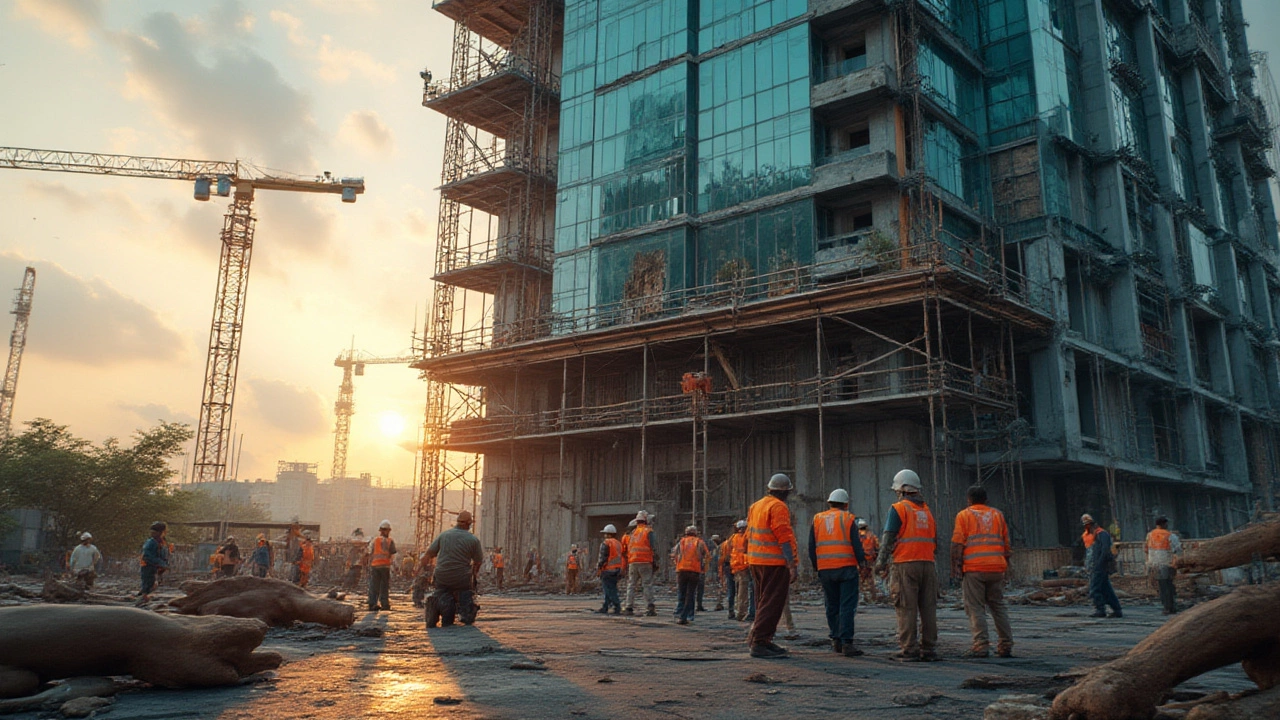If you’ve ever tried to hire a contractor for a business build, you’ve probably heard the phrase “commercial license” thrown around. Here’s the deal: that license is basically a contractor’s ticket to work on structures intended for business, like offices, stores, warehouses, or schools. Without it, a contractor legally can’t take on those jobs—at least not without risking heavy fines or worse.
It’s easy to mix up a commercial license with a residential one, but they’re not the same. Commercial licenses show that the holder knows the bigger, trickier rules for buildings where lots of people work or visit. Think about elevators, fire exits, and all the boxes a building has to check so people stay safe and the city doesn’t shut it down. The requirements to get a commercial license are usually tougher than for houses. You need more experience, more proof of insurance, and sometimes even ongoing education.
So, if you’re a business owner looking to remodel your office or put up a new storefront, don’t assume any builder can do the job. Ask for their commercial license and double check it. Plenty of headache stories start with ignoring this simple step—and nobody wants their project delayed because the city inspector caught something last minute.
- What Counts as a Commercial License?
- Why It Matters for Building Projects
- Biggest Hurdles Contractors Face
- Tips for Getting and Keeping Your License
What Counts as a Commercial License?
If there’s one thing to know about a commercial license in construction, it’s that it’s not just about having a piece of paper. For contractors, this license is like a passport specifically for bigger, non-residential projects—think huge apartment buildings, shopping centers, hotels, or factories. The rules and expectations around it are set by state and sometimes city governments, so requirements can swing a lot depending on your zip code.
So, what do you need to actually qualify for a commercial license? You’ll usually need to:
- Show proof of years of hands-on construction experience (often 4-5 years minimum, sometimes more for big-dollar projects).
- Pass a detailed exam about commercial building codes, workplace safety, laws, and basic business skills.
- Carry solid liability insurance and bond coverage—without this, you’re not even in the game.
- Submit background checks, business paperwork, and sometimes proof you’ve completed a certain number of jobs without major complaints.
And here’s something that trips up a lot of good contractors: residential and commercial licenses are not interchangeable. If your plumber cousin has a license to fix up family homes, he’s not automatically allowed to tackle the systems in a 10-story office building. Same goes for general contractors—taking a shortcut isn’t worth the risk.
Some states make it clear by giving out separate licenses just for commercial construction. In California, for example, there’s a Class B license for general contractors and then a separate one if you want to take on bigger commercial projects. Texas has a similar setup, although the cities and counties often have their own layers of red tape.
| State | Commercial License Needed? | Typical Requirements |
|---|---|---|
| California | Yes | Class B or specialty; exam, insurance, experience |
| Texas | Yes, varies by city | Proof of experience, insurance, sometimes exam |
| New York | Yes | City license, insurance, business docs |
If you’re a business owner or investor, always make sure your contractor has the right commercial license and that it’s up-to-date. Most states make this easy to check online. One old trick—ask to see not just the license card but also the insurance certificate with their name on it. That way you’re not just trusting their word (or a Photoshop job on a badge).
Why It Matters for Building Projects
Having a commercial license isn’t just red tape—it’s what keeps your build legal, safe, and moving forward. First off, most city or county building departments won’t even look at your permit application if your contractor can’t show a valid commercial license. No license, no permit, no project. That’s about as clear-cut as it gets.
Then there’s the safety side. Commercial projects are way more complicated than fixing up a kitchen at home. You’ve got stricter fire rules, accessibility needs, and tougher building codes. A licensed commercial contractor knows how to handle sprinkler systems, emergency exits, elevators, and wiring that has to be built for way more power than you’d ever need in a house. Skip the license, and you risk opening a building nobody can legally use—or worse, putting people in danger.
The insurance piece matters, too. Most serious insurers won’t cover commercial work unless everyone on the project is licensed. If something goes wrong and there’s a lawsuit or damage, you’re way more protected if you hired someone who can show their commercial license. I’ve seen cases where insurance flat-out refused to pay claims because the contractor wasn’t properly licensed.
| Risk | With Commercial License | Without Commercial License |
|---|---|---|
| Legal Project Approval | Yes | No |
| Building Insurance | Covered | Denied |
| Code Compliance Issues | Low | High |
| Chance of Fines/Project Delay | Low | High |
Most business owners don’t realize that getting caught without a commercial license can mean big city fines or a stop-work order. Sometimes, you might even have to rip out work that’s already been finished. If you’ve scheduled a grand opening or got tenants lined up, blowing your timeline can turn into a financial mess real quick.
If you want your building project to run smooth, stay legal, and avoid nasty surprises, always ask about that license right away. It’s the single simplest way to protect your investment when it comes to commercial construction.

Biggest Hurdles Contractors Face
Chasing a commercial license might sound simple, but the real world throws plenty of roadblocks in the way. If you talk to guys on the ground, they’ll tell you it’s a tough mountain to climb, especially for new contractors. The paperwork feels endless, and rules change depending on where your job site is. In some cities, even missing a single document can mean starting over.
Experience is another big sticking point. Most states ask for three to five years of proven commercial work—residential jobs don’t always count. And don’t even think about skipping the exams. These are no joke: they cover construction law, safety codes, and even environmental rules. More than a few folks wind up taking the test more than once. You’ll also need solid proof of insurance in most places, and lately, a clean safety record means everything.
"Navigating the process for a commercial license can be an obstacle course. It’s not just about skills; it’s about knowing the regulations inside and out." — National Association of State Contractors Licensing Agencies (NASCLA)
The fees pile up too. Applying in Houston, for example, costs up to $500 just to sit for the exam, plus a yearly renewal fee. And then cities can have their own extra requirements on top of the state ones—that means double the paperwork and double the headache.
- Building permits take longer to process with commercial projects.
- State background checks are stricter than for residential licenses.
- If you subcontract, everyone under you needs to be licensed or you get the blame if something goes wrong.
- Insurance minimums are higher—sometimes five times what a residential contractor needs.
If you’re thinking about cutting corners, think again. Getting caught without a valid commercial license can land huge fines. In 2023, California handed out over $3 million in fines in one year just to unlicensed operators in commercial construction.
Bottom line? Patience is key, and getting organized early saves a ton of trouble down the road. The process is tricky, but the headaches for skipping steps are worse.
Tips for Getting and Keeping Your License
Nailing your commercial license isn’t just about filling out a form and paying a fee. There’s a lot more to it, especially in commercial construction. Here’s a straight-up breakdown of what you need to do, along with a few hacks that’ll make things smoother.
- Know Your State’s Rules: Every state sets its own requirements for a commercial license. You’ll usually need to prove experience with bigger projects, pass a construction exam, and show proof of insurance and, sometimes, a background check.
- Get Your Paperwork in Order: Just sticking the forms in a drawer won’t cut it. You’ll need to keep proof of projects, test scores, liability insurance, worker’s comp, and references ready to show.
- Stay Up to Date: Many states (like California and Texas) demand license renewal every year or two. Some even require you to complete ongoing education to stay current on building codes and safety standards.
- Don’t Cut Corners: If you’re tempted to work without a commercial license, it’s not worth it. Fines can hit thousands—and your reputation takes a hit that can kill future business. I know a local team that lost a $500k contract over expired paperwork. Ouch.
Want to get a sense for what states actually ask for? Here’s a quick snapshot from three of the strictest:
| State | Minimum Experience (Years) | Exam Required | Insurance Minimum |
|---|---|---|---|
| California | 4 | Yes | $1M Liability |
| Texas | 5 | Yes | $500k Liability |
| Florida | 4 | Yes | $300k Liability |
Once you’ve got it, keeping your commercial license is all about staying ahead. Set calendar reminders for renewals. Attend required classes—sometimes they’re just a few hours online. And never forget to double-check your insurance before a big job. Forget one piece, and you might have to stop work mid-project. That’s a nightmare nobody needs.



